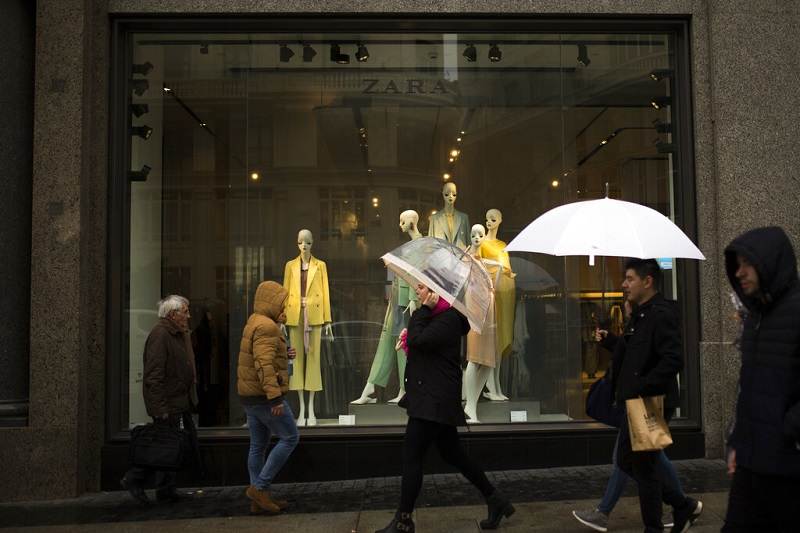
People walk past a display window of a Zara shop at the Gran Via avenue in Madrid in March 2018.
15:45 JST, March 31, 2022
BRUSSELS (AP) — The European Union warned consumers to stop using their clothes like throwaway items and said Wednesday that it plans to counter the polluting use of mass-market fast fashion.
New rules proposed by the EU’s executive arm call for a mandatory minimum use of recycled fibers by 2030 and would ban the destruction of many unsold products. The European Commission rules also seek to contain the release of microplastics and improve global labor conditions in the garment industry.
“We want sustainable products to become the norm,” commission Vice President Frans Timmermans said. “The clothes we wear should last longer than three washes.”
The changes would require a massive shift in an industry that in order to keep costs and prices down, produces items with a short life span in developing nations in Asia and Latin America, often under poor working conditions.
“All textiles should be long lasting, recyclable, made of recycled fibers and free of dangerous substances. The strategy also aims to boost reuse and repair sectors and address textile waste,” Timmermans said.
Almost three-quarters of all clothing and textiles used in EU are imported. In 2019, the 27-nation bloc imported over 80 billion euros ($89.2 billion) in clothes, mainly from China, Bangladesh and Turkey, according to the European Commission, and the average consumer throws away 11 kilos (over 24 pounds) of textiles a year.
Fast fashion is most closely associated in Europe with the high street — commercial areas where clothes-hunters shop at mass-market retailers such as H&M, Primark and Zara. The EU, although targeting clothing made for that market, also wants luxury brands to set the standard for sustainable fashion in an industry where the fleeting and ephemeral is essential to turnover.
“There’s a cultural change taking place,” Timmermans said, added that major fashion houses “are always the first to show the way forward.”
“The designers, the artists – they realize that the world has changed and that we need to revisit the way we design fashion,” he said.
Sustainability is a new frontier in the luxury industry. Upcycling and other methods to reduce the carbon footprint have been mainstays for some of the most famous brands on the runways of London and Paris, such as Stella McCartney, which belongs to the Kering group, and more recently Chloe under sustainability-conscious designer Gabriela Hearst.
Top Articles in News Services
-

Survey Shows False Election Info Perceived as True
-

Prudential Life Expected to Face Inspection over Fraud
-

Hong Kong Ex-Publisher Jimmy Lai’s Sentence Raises International Outcry as China Defends It
-

Japan’s Nikkei Stock Average Touches 58,000 as Yen, Jgbs Rally on Election Fallout (UPDATE 1)
-

Trump Names Former Federal Reserve Governor Warsh as the Next Fed Chair, Replacing Powell
JN ACCESS RANKING
-

Japan PM Takaichi’s Cabinet Resigns en Masse
-

Japan Institute to Use Domestic Commercial Optical Lattice Clock to Set Japan Standard Time
-

Israeli Ambassador to Japan Speaks about Japan’s Role in the Reconstruction of Gaza
-

Man Infected with Measles Reportedly Dined at Restaurant in Tokyo Station
-

Man Infected with Measles May Have Come in Contact with Many People in Tokyo, Went to Store, Restaurant Around When Symptoms Emerged

























